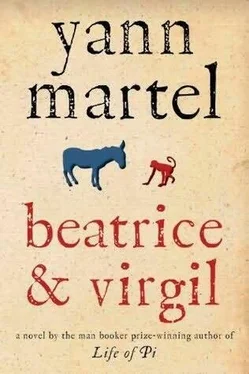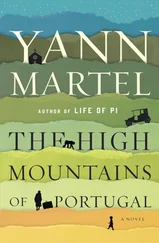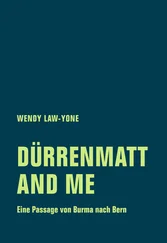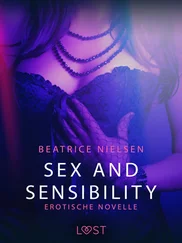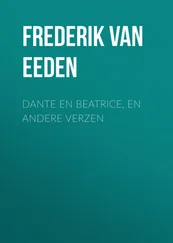Yann Martel - Beatrice and Virgil
Здесь есть возможность читать онлайн «Yann Martel - Beatrice and Virgil» весь текст электронной книги совершенно бесплатно (целиком полную версию без сокращений). В некоторых случаях можно слушать аудио, скачать через торрент в формате fb2 и присутствует краткое содержание. Жанр: Современная проза, на английском языке. Описание произведения, (предисловие) а так же отзывы посетителей доступны на портале библиотеки ЛибКат.
- Название:Beatrice and Virgil
- Автор:
- Жанр:
- Год:неизвестен
- ISBN:нет данных
- Рейтинг книги:5 / 5. Голосов: 1
-
Избранное:Добавить в избранное
- Отзывы:
-
Ваша оценка:
- 100
- 1
- 2
- 3
- 4
- 5
Beatrice and Virgil: краткое содержание, описание и аннотация
Предлагаем к чтению аннотацию, описание, краткое содержание или предисловие (зависит от того, что написал сам автор книги «Beatrice and Virgil»). Если вы не нашли необходимую информацию о книге — напишите в комментариях, мы постараемся отыскать её.
A famous author receives a mysterious letter from a man who is a struggling writer but also turns out to be a taxidermist, an eccentric and fascinating character who does not kill animals but preserves them as they lived, with skill and dedication – among them a howler monkey named Virgil and a donkey named Beatrice…
Beatrice and Virgil — читать онлайн бесплатно полную книгу (весь текст) целиком
Ниже представлен текст книги, разбитый по страницам. Система сохранения места последней прочитанной страницы, позволяет с удобством читать онлайн бесплатно книгу «Beatrice and Virgil», без необходимости каждый раз заново искать на чём Вы остановились. Поставьте закладку, и сможете в любой момент перейти на страницу, на которой закончили чтение.
Интервал:
Закладка:
"Where do you see the book being displayed?" asked the bookseller, as he chewed on his food with an open mouth. "In the fiction section or the nonfiction?"
"Ideally both," Henry replied.
"Not going to happen. Too confusing. Do you know how much stock a bookstore handles? And if we have to worry about turning the book every which way so the right cover is facing out, we'll never see the end of it. And where are you going to put the bar code? It always goes on the back cover. Where do you put a bar code on a book with two front covers?"
"I don't know," said Henry. "On the spine."
"Too narrow."
"On the inside flap."
"Cashiers can't be opening the book up, looking for it everywhere. And what if the book is plastic-wrapped?"
"On a little wraparound band."
"They tear and fall off. And then you don't have a bar code at all-a nightmare."
"I don't know then. I wrote my book on the Holocaust without worrying about where the fucking bar code would go."
"Just trying to help you sell your book," said the bookseller, rolling his eyes.
"What I think Jeff is pointing out," interrupted one of Henry's editors, coming to the rescue, "is that there are certain problems, practical and conceptual, with the book that need to be addressed. For your own good," she emphasized.
Henry tore a piece of bread and furiously swiped at a tapenade made of olives that came from an exclusive grove of six trees in a remote corner of Sicily. He noticed the asparagus. The waiter had expounded at great length on the sauce, its culinary sophistication, the refinement of its ingredients, on and on. By the sounds of it, one lick of the stuff and you had as good as earned a Ph.D. Henry stabbed an asparagus, wiped it in the pinkish drizzle and stuffed it in his mouth. He was too distracted to taste anything but green mushiness.
"Let's take a different approach," the historian suggested. He had a friendly face and a soothing voice. He tilted his head and peered at Henry over his glasses. "What's your book about?" he asked.
Henry was thrown into confusion. An obvious question, perhaps, but not one that he could answer so easily. That's why people write books, after all, to give full answers to short questions. And the bookseller had rankled him. Henry took a deep breath and collected himself. He tried his best with the historian's question. But his answer came out in stammers and meanders. "My book is about representations of the Holocaust. The event is gone; we are left with stories about it. My book is about a new choice of stories. With a historical event, we not only have to bear witness, that is, tell what happened and address the needs of ghosts. We also have to interpret and conclude, so that the needs of people today , the children of ghosts, can be addressed. In addition to the knowledge of history, we need the understanding of art. Stories identify, unify, give meaning to. Just as music is noise that makes sense, a painting is colour that makes sense, so a story is life that makes sense."
"Yes, yes, perhaps," the historian said, brushing Henry's words aside, staring at him harder, "but what's your book about?"
A buzz of nervousness shook Henry on the inside. He tried another tack, to do with the idea behind the flip book. "Fiction and nonfiction are not so easily divided. Fiction may not be real, but it's true; it goes beyond the garland of facts to get to emotional and psychological truths. As for nonfiction, for history, it may be real, but its truth is slippery, hard to access, with no fixed meaning bolted to it. If history doesn't become story, it dies to everyone except the historian. Art is the suitcase of history, carrying the essentials. Art is the life buoy of history. Art is seed, art is memory, art is vaccine." Henry could sense that the historian was about to interrupt him and he hurried along incoherently. "With the Holocaust, we have a tree with massive historical roots and only tiny, scattered fictional fruit. But it's the fruit that holds the seed! It's the fruit that people pick. If there is no fruit, the tree will be forgotten. Each of us is like a flip book," Henry pursued, though it didn't follow from what he was just saying. "Each one of us is a mixture of fact and fiction, a weaving of tales set in our real bodies. Isn't that so?"
"I get all that," the historian said with a trace of impatience. "But once again, what is your book about?"
To that third iteration of the question, Henry had no answer. Perhaps he didn't know what his book was about. Perhaps that was the problem with it. His chest rose as he breathed in heavily and sighed. He stared at the white tablecloth, red-faced and at a loss for words.
An editor broke the awkward silence. "Dave has a point," he said. "There needs to be a tighter focus in both the novel and the essay. This book you've written is tremendously powerful, a remarkable achievement, we all agree on that, but as it stands now, the novel lacks drive and the essay lacks unity."
The waiter arrived, Henry's constant saviour during that catastrophic lunch, bringing a new dish, the pretext for a change of topic, forced gaiety and grim eating, until another editor, or the bookseller, or the historian, felt the professional urge-and perhaps the personal one-to take up his or her rifle, take aim at Henry, and shoot again. That was the whole meal, a blundering lurch from the frivolity of over-refined food to the dismemberment of his book, Henry quibbling and squabbling, they reassuring and wrecking, to and fro, back and forth, until there was no more food to eat and nothing left to say. It all came out, wrapped in the kindest words: the novel was tedious, the plot feeble, the characters unconvincing, their fate uninteresting, the point lost; the essay was flimsy, lacking in substance, poorly argued, poorly written. The idea of the flip book was an annoying distraction, besides being commercial suicide. The whole was a complete, unpublishable failure.
When at last lunch ended and he was released, Henry walked out in a daze. Only his legs seemed to be working. They set him off in an unknown direction. After a few minutes he came upon a park. Henry was surprised at what he found there. In Canada, where Henry was from, a park is usually a sanctuary of trees. This London park was not like that. It was an expanse of the loveliest grass, a symphony of green. There were some trees, but they stood very tall with high branches, as if they were mindful of not getting in the way of the unbridled grass. A round pond gleamed in the centre of the park. The weather was warm and sunny and people were out in great numbers. As he wandered about the park, Henry awoke to what had just happened to him. Five years of work had been consigned to oblivion. His mind, stunned into silence, sputtered to life. I should have said this… I should have said that… Who the fuck was he…? How dare she…? -so the shouting match in his head went, a full-blown anger fantasy. Henry tried to call his wife, Sarah, in Canada, but she was at work, her cell phone off. He left a rambling, heartbroken message on their voice mail.
A moment came when the tense muscles twitching in Henry's body and the emotions seething inside him came together and spoke in unison: with his fists clenched in the air, he lifted a foot and stamped the ground with all his might, at the same time letting out a choked-up sound from his throat. He hadn't consciously decided to act out like this. It just happened, a snap expression of hurt, fury and frustration. He was near a tree, the soil around it soft and bare, and the impact of his foot-stamping was thunderous, certainly to him, and a couple lying nearby turned his way because of it. Henry stood, amazed. The ground had trembled. He had felt the reverberations. The earth itself had heard him, he thought. He looked up at the tree. It was a giant tree, a galleon with its sails in full rig, an art museum with its entire collection on display, a mosque with a thousand worshippers praising God. He gazed at it for several minutes. A tree had never before been so soothing to him. As he admired it, he could feel the anger and distress draining from him.
Читать дальшеИнтервал:
Закладка:
Похожие книги на «Beatrice and Virgil»
Представляем Вашему вниманию похожие книги на «Beatrice and Virgil» списком для выбора. Мы отобрали схожую по названию и смыслу литературу в надежде предоставить читателям больше вариантов отыскать новые, интересные, ещё непрочитанные произведения.
Обсуждение, отзывы о книге «Beatrice and Virgil» и просто собственные мнения читателей. Оставьте ваши комментарии, напишите, что Вы думаете о произведении, его смысле или главных героях. Укажите что конкретно понравилось, а что нет, и почему Вы так считаете.
